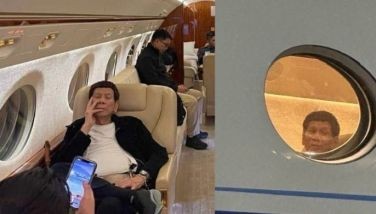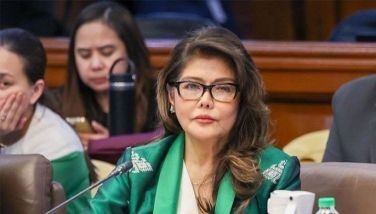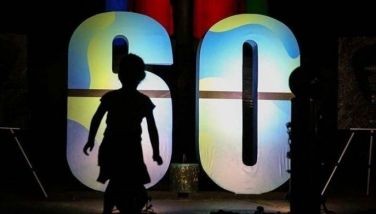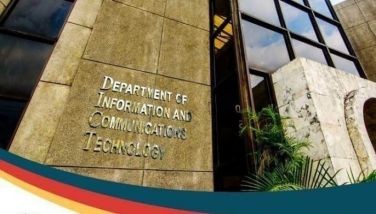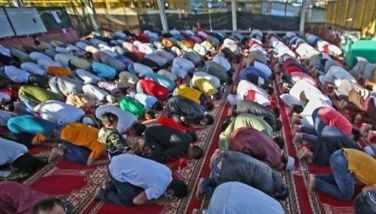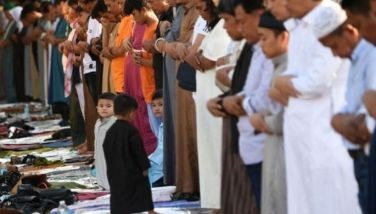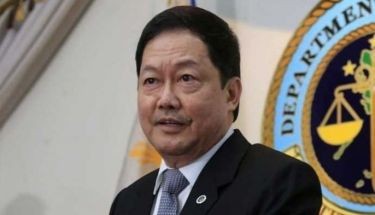RP, US agree to crush Abus ‘once and for all’
May 21, 2003 | 12:00am
WASHINGTON (AFP) — The United States and the Philippines agreed yesterday on a new joint military effort to stamp out the Muslim Abu Sayyaf group "once and for all."
President George W. Bush also offered President Arroyo $30 million in new aid for training and equipping the Philippine armed forces, according to a joint statement issued after their talks during a White House state visit.
Bush had earlier publicly promised to make the Philippines a non-NATO ally of the United States, clearing the way for increased US military loans, cut-price US military equipment and other training benefits for Manila’s armed forces.
"The two presidents reaffirmed their commitment to destroy the Abu Sayyaf (ASG) group once and for all," the joint statement said.
"Toward that end, President Bush and President Arroyo agreed to hold another joint military activity in the near term, in which the United States will provide support to ongoing Armed Forces of the Philippines-led operations against the ASG."
US military aid to Manila rose to about $20 million a year in 2002 as US Special Forces troops deployed in Basilan to train Filipino troops hunting down the Abu Sayyaf, which had kidnapped tourists including three Americans.
A second batch of US forces are expected in the western half of the Mindanao region as early as next month.
But there was no detail in the joint statement of the rules of engagement for the US force, nor information on how large it would be.
A previous effort this year to launch an operation which could have seen US soldiers battling the rebels alongside Philippine forces foundered on a controversy over the rules of engagement for US personnel.
The Abu Sayyaf are a Muslim rebel group that has been kidnapping Christians and foreigners for a decade, demanding hefty ransom payments for their release and sometimes killing their captives.
Both Washington and Manila have linked the Abu Sayyaf to the al-Qaeda network of Osama bin Laden.
Bush also offered the Philippine forces 20 UH-1H helicopters as "they become available" and said an additional 10 models would be deployed to ensure sufficient spare parts.
He agreed the US military would perform a comprehensive review of Philippine security needs and how it could help Manila’s military.
It did not appear that the offer matched the wish list of military equipment military chief of staff Gen. Narciso Abaya earlier laid out, which he said was needed to crush Muslim rebels.
Abaya said the Philippines needed helicopters and transport aircraft, improved communications capability and naval vessels, which would cost "hundreds of millions of dollars."
President George W. Bush also offered President Arroyo $30 million in new aid for training and equipping the Philippine armed forces, according to a joint statement issued after their talks during a White House state visit.
Bush had earlier publicly promised to make the Philippines a non-NATO ally of the United States, clearing the way for increased US military loans, cut-price US military equipment and other training benefits for Manila’s armed forces.
"The two presidents reaffirmed their commitment to destroy the Abu Sayyaf (ASG) group once and for all," the joint statement said.
"Toward that end, President Bush and President Arroyo agreed to hold another joint military activity in the near term, in which the United States will provide support to ongoing Armed Forces of the Philippines-led operations against the ASG."
US military aid to Manila rose to about $20 million a year in 2002 as US Special Forces troops deployed in Basilan to train Filipino troops hunting down the Abu Sayyaf, which had kidnapped tourists including three Americans.
A second batch of US forces are expected in the western half of the Mindanao region as early as next month.
But there was no detail in the joint statement of the rules of engagement for the US force, nor information on how large it would be.
A previous effort this year to launch an operation which could have seen US soldiers battling the rebels alongside Philippine forces foundered on a controversy over the rules of engagement for US personnel.
The Abu Sayyaf are a Muslim rebel group that has been kidnapping Christians and foreigners for a decade, demanding hefty ransom payments for their release and sometimes killing their captives.
Both Washington and Manila have linked the Abu Sayyaf to the al-Qaeda network of Osama bin Laden.
Bush also offered the Philippine forces 20 UH-1H helicopters as "they become available" and said an additional 10 models would be deployed to ensure sufficient spare parts.
He agreed the US military would perform a comprehensive review of Philippine security needs and how it could help Manila’s military.
It did not appear that the offer matched the wish list of military equipment military chief of staff Gen. Narciso Abaya earlier laid out, which he said was needed to crush Muslim rebels.
Abaya said the Philippines needed helicopters and transport aircraft, improved communications capability and naval vessels, which would cost "hundreds of millions of dollars."
BrandSpace Articles
<
>
- Latest
- Trending
Trending
Latest
Trending
Latest
Recommended




















